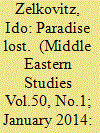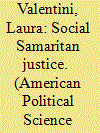| Srl | Item |
| 1 |
ID:
128212


|
|
|
|
|
| Publication |
2014.
|
| Summary/Abstract |
The article discusses the evolution of the Palestinian community in Kuwait in the wake of the 1948 War. The demand for skilled labour facilitated the gradual integration of the Palestinians into Kuwaiti society, especially in the education system and state institutions. In this regard the article examines the role of education and students in creating personal and political socio-economic networks. The relatively liberal political atmosphere in Kuwait during its years of development transformed it into a hotbed for Palestinian political activism. This trend continued up to the 1991 Gulf War, when Yasir Arafat's support of Saddam Husayn in that wa, caused the fall from grace of the Palestinians in Kuwait. This ended the central role that the Palestinians played in the historical process of Kuwait state building. Following the death of Arafat the PLO began to seek reconciliation with Kuwait. At this timely moment in the history of relations between these two communities, the article sheds light on these efforts.
|
|
|
|
|
|
|
|
|
|
|
|
|
|
|
|
| 2 |
ID:
143143


|
|
|
|
|
| Summary/Abstract |
In late 2012, Hurricane Sandy hit the East Coast of the U.S., causing much suffering and devastation. Those who could have easily helped Sandy's victims had a duty to do so. But was this a rightfully enforceable duty of justice, or a nonenforceable duty of beneficence? The answer to this question is often thought to depend on the kind of help offered: the provision of immediate bodily services is not enforceable; the transfer of material resources is. I argue that this double standard is unjustified, and defend a version of what I call “social samaritanism.” On this view, within political communities, the duty to help the needy—whether via bodily services or resource transfers—is always an enforceable demand of justice, except when the needy are reckless; across independent political communities, it is always a matter of beneficence. I defend this alternative double standard, and consider its implications for the case of Sandy.
|
|
|
|
|
|
|
|
|
|
|
|
|
|
|
|
| 3 |
ID:
111214


|
|
|
|
|
| Publication |
2012.
|
| Summary/Abstract |
How have different cultures and peoples constructed their political communities and organized their international life in history? In which ways has order been differently conceptualized and pursued through a diverse range of institutional practices in different cultural and world historical contexts, and why? What were world orders like before the rise of capitalism and the expansion of Europe and the imposition of the Westphalian model? How is it possible to explain why different international societies, as we understand them today, have created different fundamental institutions and adopted radically different institutional designs in their pursuit of peace and cooperation across space and time? Why is it important to consider the transformation of international orders beyond European history in theorizing International Relations? From where does the current global order emerge in deep world historical terms? These are among a number of key questions raised in collective critical reflections on and re-evaluation of the theorizing enterprise within the discipline of International Relations (IR). They are questions that have been explored and interrogated during the last two decades as part of our efforts to understand the still unfolding systemic transformation of international relations. The search for answers to these questions marks a discernible turn in the studies of IR to History.
|
|
|
|
|
|
|
|
|
|
|
|
|
|
|
|